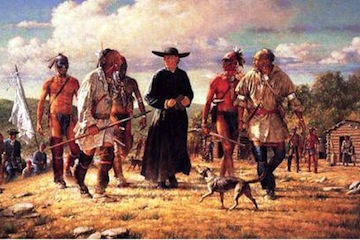Before the French and Indian War -- The Rivalry of England and France
Throughout the 17th and 18th centuries there were two colonial powers in the northeast of North America. One, of course, was England. The other was France. These two nations fought regularly over land and maritime rights. The French and Indian War is best known to modern Americans, occurring shortly before the American Revolution. But the two sides had been fighting for almost a hundred years before that time. These struggles took on the names of their contemporary sovereigns -- King William's War, Queen Anne's War, and King George's War. None of them provided any long-term solution to the rivalry between England and France.
King William's War was fought between 1688 and 1697. It was named in honor of King William III of the Glorious Revolution. When William ascended to the English throne, a European War immediately broke out between England and France. A corresponding struggle broke out in North America, centered in Maine/Acadia. Most of the local Indian tribes, having witnessed the English carnage of King Philip's War, banded with the French. The war was brutal, given the small number of people involved. Hundreds were killed in raids and counterattacks between the two sides. Many of them were villagers both white and Indian who found themselves caught on the wrong side of hostilities. Yet the final result was status quo ante bellum. No boundaries changed and no issues were settled.
Queen Anne's War was fought between 1702 and 1713. It was named in honor of Queen Anne, who came to the throne of England in 1702. This war was the American theatre of the War of Spanish Succession, and England fought against both Spain and France in North America. Hundreds more died, but this war ended in a victory for the British. France ceded parts of its Canadian possessions in Acadia. These areas would stay in English-speaking Canada after the American Revolution and form much the Maritime Provinces. The position of Spain in Florida was also weakened. Georgia was founded after the end of this war as a military colony, in an expansionist movie by the English.
King George's War was fought between 1744 and 1748. It was named for King George II. This war was related to the War of Austrian Succession in Europe. The great English success was the capture of Louisbourg, a French fortress in Nova Scotia. Hundreds of English colonists were killed in New England and upstate New York. At the end of the war, Louisbourg was returned to the French in return for other concessions, and many colonists did not think it was a fair exchange. Other issues were again left unresolved.
There is a common theme to all of these wars. They broke out in tandem with the wars of Europe. They were fought with small numbers of soldiers. They did not spare civilians or Indians. Most importantly, they ended ambiguously, settled little, and left the issues of the continent open to further conflicts. It was only with the complete English victory in the French and Indian War that this changed. Even without the subsequent revolution, the French and Indian War would have been a watershed moment in North American history.
The nomenclature of these wars can be confusing. The French and Indian War was fought from 1756-1763. The other wars detailed above are collectively known as the French and Indian Wars. The French and Indian War was the final war in the French and Indian Wars. The wars were thus named because most Indian tribes allied with the French. The French had fewer settlers and obviously posed less of a threat to the Indian lands. They also generally treated the Indians better and solicited their friendship. The big exception to this generalization was the alliance between the English and the Iroquois. The Iroquois had their own grievances and rivalries with competing tribes, and thought the English could be used to their advantage. It was not yet obvious what the final outcome of the American settlement would be for their tribe.
